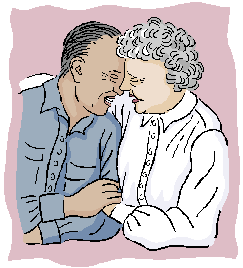

E-Dating
Report by: Robert Austin
Computer technology has affected the various activities
that we continue to do in our lives, such as being able to communicate by e-mail
and telephone with long-distance friends, instead of having to write letters or
visit these friends to be able to communicate with them.
Computer technology has also affected the way that humans find potential
mates, also known as dating. Dating
has now advanced to e-dating, which is also known as cyber dating or internet
dating, from the traditional ways of finding a mate, or potential spouse, by
either running an ad in the personals section of a newspaper or having to go to
bars and clubs to meet people.
![]()
![]()
There have been success stories of e-dating for couples, such as Angela Autry and Eric Reed. According to their story, found on ivillage.com , both Eric and Angela met by going to the matchmaking site, match.com, on October 23, 1998. Angela went to the site not expecting to find anything interesting, but after seeing Eric’s ad she ICQ Eric and they began to chat with each other on their interests and lives and they soon talked to each other for several hours each day on the phone, even though Eric lived in England and Angela lived in America. After finding that they truly loved each other, Eric and Angela finally married on May 8, 1999 in southeastern England, where they now live. 1 However, for all of the success stories, there are also horrible, nightmarish stories that result from e-dating.

Dating by the Internet is continuing to grow in interest and single people are quickly leaving the traditional ways of dating for the ways of e-dating. According to New York Times columnist Perry Garfinkel, Media Matrix Inc., a company that collects information on the Internet and other digital media reports that over 5.3 million people visited an online dating service in August 2000 alone.2


The question to why a great amount of people who have never met each other in person are willing to attempt relationship and to exchange personal information with strangers can be analyzed by the operation of online dating services. According to Garfinkel, single people who wish to subscribe to an Internet dating service usually have a free-trial period that is followed by a nominal fee of approximately twenty dollars a month. 2 Some sites however offer a free dating service, in which the person has to pay by having ads from sponsors be delivered to their e-mail accounts or on pop-ups and banners on the matchmaking websites. A subscriber to one of the e-dating services then gives information about themselves through a series of questions or a self-written profile. The person than can look through the millions of profiles in hopes of finding a person who shares their interests.

Many of the dating services on the Internet allow for people of common interests to meet in a website setup to their interests. This not only allows users not to have to search through as many profiles, but also allows the user to have the comfort of being around other users with their same interests. The websites, “Christian Hearts” 3 allows people of a Christian background the opportunity to meet people with their same beliefs. People can also meet potential mates of their same race or heritage through sites that are setup for this purpose, such as “Peterlink” 4 for people of a Russian heritage and “Afroconnections” 5 where African-Americans can meet other people of their same race.

Another reason that online dating services has continued to grow is that is allows people who live in smaller town or rural areas who may have a challenge in finding people who have similar backgrounds or interests to find communities that do not lack the racial, religious, or sexual diversity of these towns. Sites like “My Gay Partner” allow for online communities where homosexual men and women can meet people who share their sexual orientation, in an environment that is safe from the harassment and judgment of their communities. 6 These smaller e-dating communities allow single people to become a part of a group that they may not have been able start in their community.

Another reason the singles use online dating services is that many find that meeting someone in person can be intimidating, which may be caused by the fear of rejection or the feelings of awkwardness at a first meeting. Conversations over the Internet can help single people who are shy or reserved to meet other singles. Henry Velez in his article “Personals’ Ads: Friend or Foe?” illustrates this point when he writes, “Some people are shy or work too many hours to find time for much socializing.”7 Since the Internet is available twenty-four hours a day, seven days a week, people can set their own schedules for meeting other singles with their same interests. This helps people who are busy with work or have a different working schedule than the normal nine to five. Shy people can be able to plan their responses to questions at their own pace, without having the pressure of meeting a person face-to-face.

E-Dating allows the subscribers to communicate with each other without having to see the appearance of the other person. This allows a person to be seen for their personality and interests and not have to deal with the snap judgments of their appearance. As Henry Velez states, some people “are tired of being assessed by their money or beauty and would like the chance to converse via the anonymity of e-mail in an attempt to be known for who they are, not what they have.” 7

The Internet relationships that can be obtained through e-dating can have benefits for the two single people looking for love in a person of the same interests, but it can also have dangers associated with these online dating services. This point is an extension of the metaphor Sara Baase used in A Gift of Fire when she compared the gift of computer technology to the gift of fire and how both can used to enhance our lives, but both can cause harm in our life. 8
As the Internet continues to grow, the number of dating sites on the web continues to grow even faster. It even seems that many Internet providers and search engines each provide their own online dating services, such as Yahoo, which has Yahoo! Personals.9 According to the article Garfinkel wrote “Cupid Goes Online for Romances that Click,” large providers such as America Online and Lycos have decided to delve into the world of Internet dating services. 2 Although many companies are well respected and can be trusted, these companies cannot always guarantee that the information given by the users of their service is truthful information. Some subscribers may use older photographs in their profiles to appear younger. Other may lie about their location in order not to seem threatening, such as people in prison who use online dating services may say that they are in a home a state away. In addition, online subscribers may distort their marital status in order to seem like they are single and available. In order to protect users of online dating services, various Internet sites post guidelines on cyber dating, or e-dating, advice from successful people in Internet dating, and warning signs of how to detect a person who may be untrustworthy on dating sites. The site “wildxangel.com” gives the warning that, “a cunning and masterful liar will jump through any hoops to satisfy their goal,” and to make sure “you are dealing with an honest person.”10

In addition to “wildxangel.com,”10 other sites offer tips for trying to stay safe while dating on the Internet. One of the safe cyber dating tips, is that a person should wait “a safe period of time” before offering such information as a phone number.10 Since a stalker may use the phone number to get the home or work address of a person and be able to stalk the person they met online. Other tips include making sure that you know the full name, address, and telephone number of a person before you go out with them, making sure that you meet a person in a public place for the first date, and never go out with a person who will only give you their pager or work number, since this may be a good indication that they may be married or already have a significant other at their residence.11


As stated before, for all of the e-dating success stories, there are also horrible, nightmarish stories that result from e-dating. Some meetings of online daters have lead to disaster. According to the site “wildxangel.com,” there was such an incident in January, 2001, when a Toronto woman who agreed to meet up with a man that she had first met online and had gotten to know and trust. They had sent e-mails and talked on the phone to each other several time and she felt that it was time that they met. The unfortunate end of this meeting was that the man showed up at her apartment and raped her.10 The more sad and unfortunate part of this story is that it is not an isolated case, but has happened to many other online daters before and may continue to happen today.
Another possible risk is that some teenagers, especially those under 16, may use an online dating service to meet a person they can have as a “boyfriend” or “girlfriend.” 12 Even though they may use this to be able to date if they are not allowed by their parents to date in real life 12, this allows pedophiles to prey on these teenagers and gain their trust. As the pedophiles gain their trust, they are able to get information out of them, which increases the risk of stalking or possible sexual crimes.
With the continuing issues of privacy on the Internet and the availability of person information, e-dating seems to have become risky. Sometimes information about the life of a person and personal details can slip into conversations while chatting with a user of an e-dating service after this person feels comfortable with the other subscriber. This may lead to great relationships like that of Angela and Eric or it may lead to stalking or even rape, as was the case with the woman from Toronto. However, if no personal information is shared and people do not meet face-to-face, then e-dating, or Internet dating, is just e-conversing, or Internet conversing. So, in conclusion, just as with other computer technology, in e-dating a person must carefully consider the risks and benefits of this activity before using it.

References